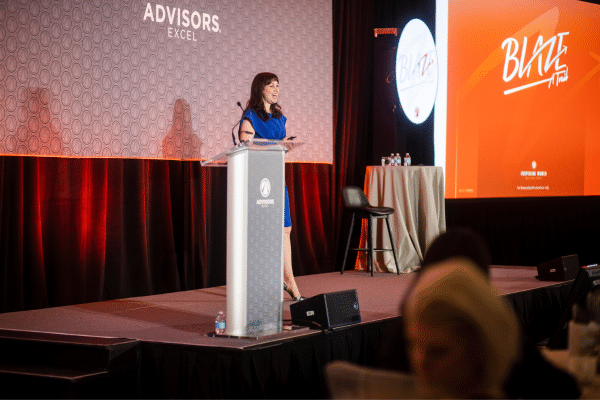Keynote Speaker Role: What They Do & Why They Matter
A keynote speaker delivers the primary speech at an event and is typically the main act of a conference. In other words, they’re like an orchestra conductor, setting the event’s underlying tone and core message with the finesse of a maestro. Their speech isn’t just a monologue; it’s a carefully orchestrated symphony designed to inspire, motivate, or provide a central theme for the event.
Fun Fact: Did you know that the term “keynote” originates from the practice of having a musical note played on a keyboard instrument, like a piano, to set the pitch for the rest of the musical performance? Similarly, a keynote speaker sets the pitch for the event, ensuring the audience is tuned in and ready for the following grand performance.
Key Takeaways
- A keynote speaker is often an expert in the particular field the event focuses on, providing knowledgeable insights and perspectives that can stimulate and inspire the audience.
- Frequently, the keynote speaker sets the underlying tone and core message of the event. They powerfully embody and convey the greater purpose of the meeting or conference.
- Keynote speakers are usually well-known personalities or figures of authority in their fields, enhancing the credibility of the event and increasing its appeal to potential attendees.
How to Identify a Top Keynote Speaker for Your Event
A stellar keynote speaker isn’t just the opening act; they’re the ignition switch for your event’s energy! Their purpose? To establish the central theme of a conference, convention, or any gathering and set it ablaze with interest and enthusiasm. It’s like they’re the storyteller who lights the fire of curiosity in everyone’s minds, compelling them to embrace the event’s message.

But here’s the real magic: a great keynote speaker doesn’t just talk; they take the reins and steer the event in the right direction. They’re the ringleaders, rallying the crowd and guiding the entire show with finesse.
They’re not just experts; they’re the Gandalfs of their fields, here to provide wisdom, a fresh perspective, and the kind of motivation that makes you want to move mountains. As influential figures, they can shine a spotlight on vital issues or lead you down a path of innovation, sparking inspiration.
See Also: Hiring a Marketing Speaker: Watch for These 7 Things
In a world of events, skilled keynote speakers are like the headliners at a music festival. They raise the bar, making the event an unforgettable experience for everyone involved. Their speeches? They’re not just words but the building blocks of intellectual growth, continued learning, and individual development.
Fun Fact: Did you know that the tradition of keynote speakers can be traced back to the ancient Greeks, who would have philosophers kick off their symposiums with thought-provoking speeches? It’s a tradition that’s been lighting up intellectual fires for centuries.
How to Hire the Best Keynote Speaker for Your Event
Finding the best keynote speaker can be a challenging process. To simplify this, I made a step-by-step approach to help you find the best speaker for yours. However, if you are looking for a great customer service speaker, I made a guide, “5 Ways to Find a Customer Service Speaker,” just for you! Here is my approach below:
Step 1: Define Your Event’s Goals and Theme
Before you start searching for a keynote speaker, it’s essential to have a clear understanding of your event’s goals, theme, and the message you want to convey. What key takeaways do you want your audience to gain from the event? Having a well-defined purpose will guide your speaker selection process.
Step 2: Research Potential Speakers for Your Event
After you define your event’s goals, you should conduct thorough research to identify potential keynote speakers. Be sure to find speakers who align with your event’s objectives.
You can start by:
- Asking for recommendations from colleagues, industry contacts, or event planning professionals.
- Using speaker bureaus and agencies that specialize in connecting event organizers with speakers.
- Exploring social media, websites, and industry publications to identify thought leaders and experts in your field.
Checking out my list of the top female motivational speakers.
Step 3: Evaluation of Speaker Credentials
Once you’ve gathered a list of potential speakers, evaluate their credentials and expertise. Look for the following:
- Relevant experience and expertise in your event’s topic or industry.
- Past speaking engagements and their ability to engage and inspire an audience.
- Testimonials or references from previous clients or event organizers.
- Availability to speak on your event date and location.
See also: How to Hire a Motivational Sales Speaker
Step 4: Consider Audience Relevance
In addition to vetting a speaker’s credentials, you need to ensure that they will relate to your attendees. Choosing a speaker who can connect with your specific audience is crucial. For instance, you will want to consider the demographics, interests, and needs of your attendees. A speaker who can relate to your audience and deliver a message that resonates with them is likelier to have a lasting impact.
Step 5: Request Proposal and Engage in Direct Communication
Finally, reach out to the selected speakers to request proposals or quotes. In these communications, make sure to:
- Clearly outline your event’s goals and expectations.
- Inquire about their availability and fees.
- Discuss any customization or specific themes you’d like them to address.
- Review their presentation style and ensure it aligns with your event’s atmosphere.
Don’t hesitate to schedule a direct conversation with potential speakers. This will help you assess their communication skills, enthusiasm for your event, and whether they can tailor their presentation to your needs.
Fun Fact: The TED (Technology, Entertainment, and Design) Conference, one of the most renowned speaking platforms globally, has a unique tradition: every speaker, regardless of their fame or expertise, has a strict maximum time limit of 18 minutes for their talk. Why only 18 minutes? It’s long enough to be substantial and short enough to hold the audience’s attention. It’s become a hallmark of TED talks and has led to some of the world’s most memorable and impactful presentations.
How to know if a keynote speaker is the right fit
Determining if a keynote speaker is the right fit for your event involves carefully considering various factors. Here are some critical steps and criteria to help you make this assessment:
- Alignment with Event Goals: The most critical factor is whether the speaker aligns with the goals and objectives of your event. Ask yourself if their message, expertise, and presentation style support the overarching theme and purpose of your gathering.
- Relevance to the Audience: Consider whether the speaker matches your audience well. Do they deeply understand your attendees’ needs, interests, and demographics? The right speaker should be able to connect with and engage your specific audience effectively.
- Expertise and Credibility: Evaluate the speaker’s expertise in the subject matter they will address. Are they a recognized authority or thought leader in the field? Ultimately, their credibility and qualifications can significantly impact the success of their message.
- Engaging Presentation Style: A great keynote speaker should be a compelling and engaging communicator. Watch videos or recordings of their past presentations, if available, to assess their speaking style, charisma, and ability to capture an audience’s attention.
- Customization Capability: It’s essential to gauge the speaker’s willingness and ability to tailor their presentation to your event’s specific needs. Can they adapt their content to match your event’s theme and message? Will they incorporate anecdotes or examples that resonate with your audience?
- Feedback and References: Ask for references or testimonials from the speaker’s previous clients or event organizers. Hearing about their experiences can provide valuable insights into the speaker’s performance and ability to meet event expectations.
- Availability and Logistics: Ensure the speaker is available on your event date and can accommodate any logistical requirements, such as travel, accommodations, and technical equipment. A speaker who can seamlessly integrate into your event’s logistics is essential.
- Budget Considerations: Your budget is an essential factor. While you may want a high-profile speaker, ensuring their fees are within your event’s budget constraints is crucial. Make sure to understand their fees and any additional costs clearly.
- Gut Feeling and Intuition: Above all, your intuition and gut feeling can be valuable. If you have a strong sense that the speaker is the right fit and can deliver a memorable experience, it’s worth considering.
See also: Six Things to Look for in a Finance Speaker.
Why is it important to find the right keynote speaker?
A keynote speaker sets the underlying tone and summarizes the event’s core message or most important revelation. They are often well-known personalities or experts in the field, thus attracting attendees and generating interest for the event.
Their speech isn’t just a standalone talk but the ‘key note’ of the larger conversation, stimulating thought, prompting dialogue, and steering the direction of multiple sessions or panels.
Therefore, their insights and observations are significant and can shape the event’s overall success and impact.
Examples of keynote speakers
Examples:
- Barack Obama at SXSW Conference: In 2016, former U.S. President Barack Obama was a keynote speaker at the South by Southwest (SXSW) conference. He delivered a speech about the role of technology and innovation in America’s future and touched on important topics like civic engagement and climate change.
- Susan Wojcicki at VidCon: Susan Wojcicki, the CEO of YouTube, gave the keynote speech at the annual VidCon conference in 2019, where she spoke about the evolution of YouTube, its plans, and how creators have used the platform to inspire, educate, and bring change in society.
- Bill Gates at the International Conference on Global Health: As a technology visionary and philanthropist, Bill Gates delivered keynote speeches at multiple conferences, including the International Conference on Global Health. He provided insights on topics like disease prevention, vaccination, and the role of technology in global health.
Fun Fact: In 2005, Steve Jobs, co-founder of Apple Inc., delivered a now-legendary commencement speech at Stanford University. During this speech, he shared three stories from his life, including a segment where he talked his termination from Apple, the company he co-founded. He ended this part of his speech by saying, “I didn’t see it then, but it turned out that getting fired from Apple was the best thing that could have ever happened to me. The heaviness of success was replaced by the lightness of being a beginner again, less sure about everything. It freed me to enter one of the most creative periods of my life.”
This speech has since become one of the most-watched commencement addresses on YouTube. As a result, people often reference this speech for its inspiration and insight into the life of one of the most influential figures in the tech industry.
Frequently Asked Questions (FAQ):
Q1: What is a keynote speaker?
A: A keynote speaker is a person who delivers the primary message or most important speech at a gathering or event. This person sets the tone or theme and often motivates, inspires, or educates the audience.
Q2: What does a keynote speaker do?
A: A keynote speaker delivers a presentation that typically opens and sets the underlying tone for a specific event or conference. Moreover, they can also highlight and reinforce the primary purpose of the event.
Q3: What qualifications must a keynote speaker have?
A: A keynote speaker should ideally be an expert or well-versed in the area covered by the event. They should be engaging, articulate, inspiring, and have a strong stage presence.
Q4: Can anyone become a keynote speaker?
A: In theory, anyone can aim to become a keynote speaker. However, it requires a particular set of skills. It demands expertise in a specific topic, strong public speaking skills, and the ability to engage an audience.
Q5: Do keynote speakers make money?
A: Yes, many events compensate keynote speakers for their contribution, especially if they are experts in their field. The payment varies greatly depending on the speaker’s fame, the event size, the budget of the organization, and other factors.
Q6: How long does a keynote speech usually last?
A: The length of the keynote speech can vary depending on the event’s schedule, but generally, a keynote speech lasts between 20 and 45 minutes.
Q7: How should a keynote speaker prepare?
A: A keynote speaker should thoroughly understand the event’s theme, audience, and expectations. Additionally, they should prepare their material meticulously, practice their delivery, and be ready to engage with the audience, often using a mix of knowledge, humor, and storytelling.
Q8: What is the difference between a keynote speaker and a guest speaker?
A: A keynote speaker sets the overarching theme of the event and usually speaks at the beginning or end of the event. In contrast, guest speakers contribute to the event but don’t necessarily set the tone. They may speak on more specific topics within the theme at various times during the event.
Are you looking for a keynote speaker?
SEE WHY KEYNOTE SPEAKER AND AWARD-WINNING ENTREPRENEUR BRITTANY HODAK CREATES SUPERFANS EVERYWHERE SHE PRESENTS!

Brittany Hodak is an international keynote speaker and award-winning entrepreneur. She teaches leaders to cure apathy by harnessing the power of super fandom.
Brittany prides herself on being more than just entertaining — she aims to be highly engaging, too! Her high-energy keynotes are “the perfect mix between a hilarious stand-up comedian and a brilliant professor.” With each presentation, she makes customer engagement not only accessible but exciting, which is why more than 90% of Brittany’s calendar comprises referral gigs.

